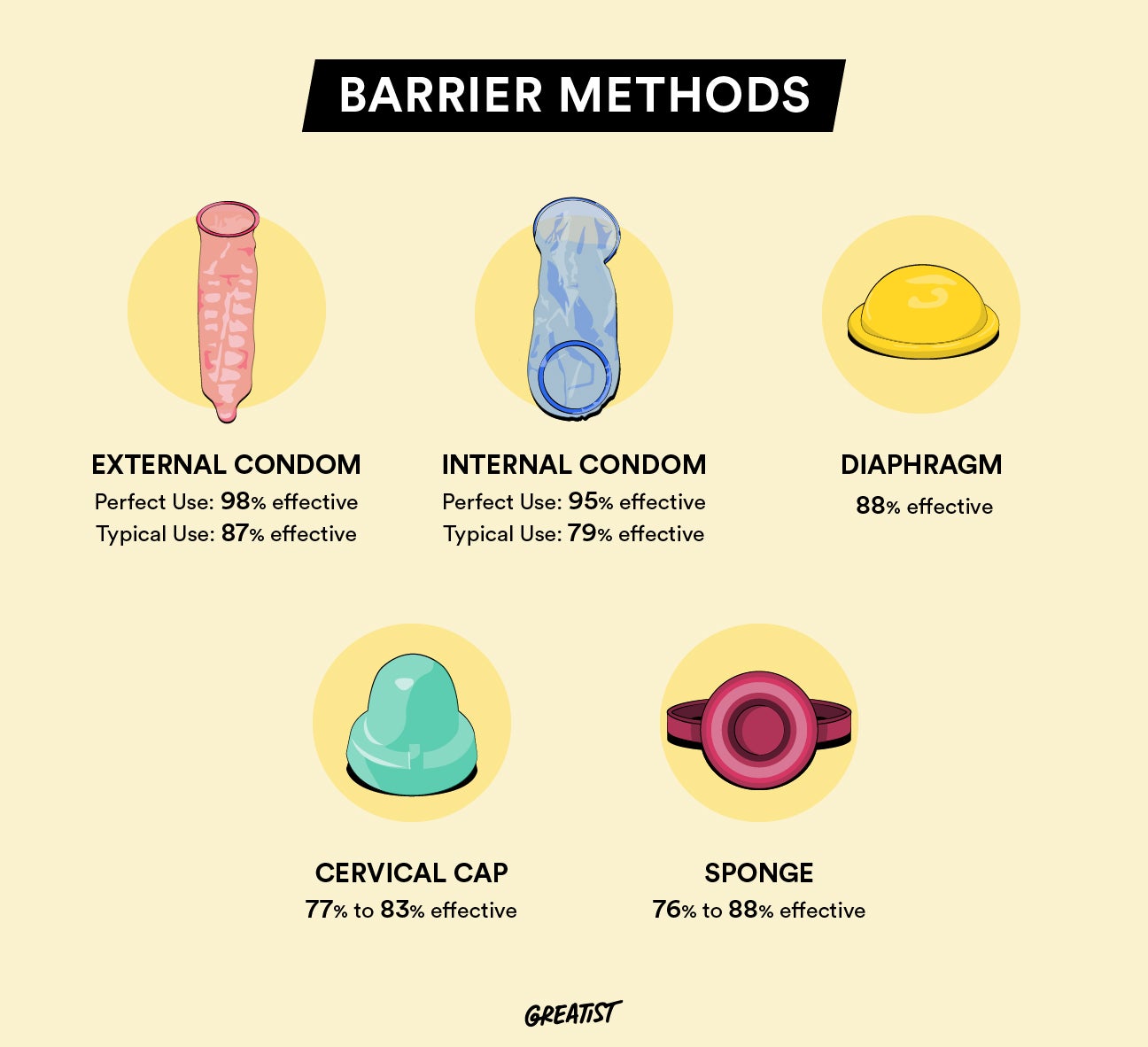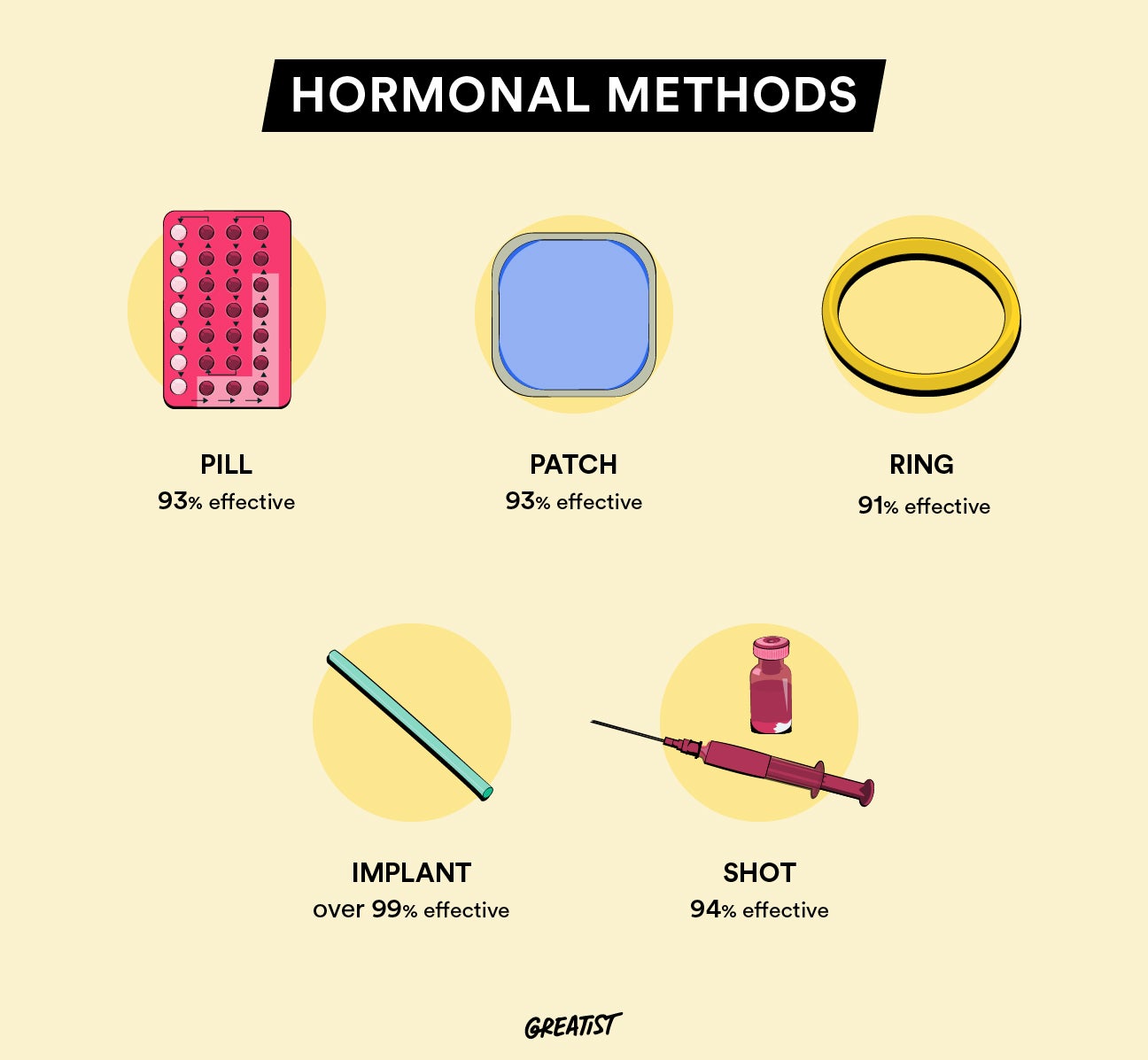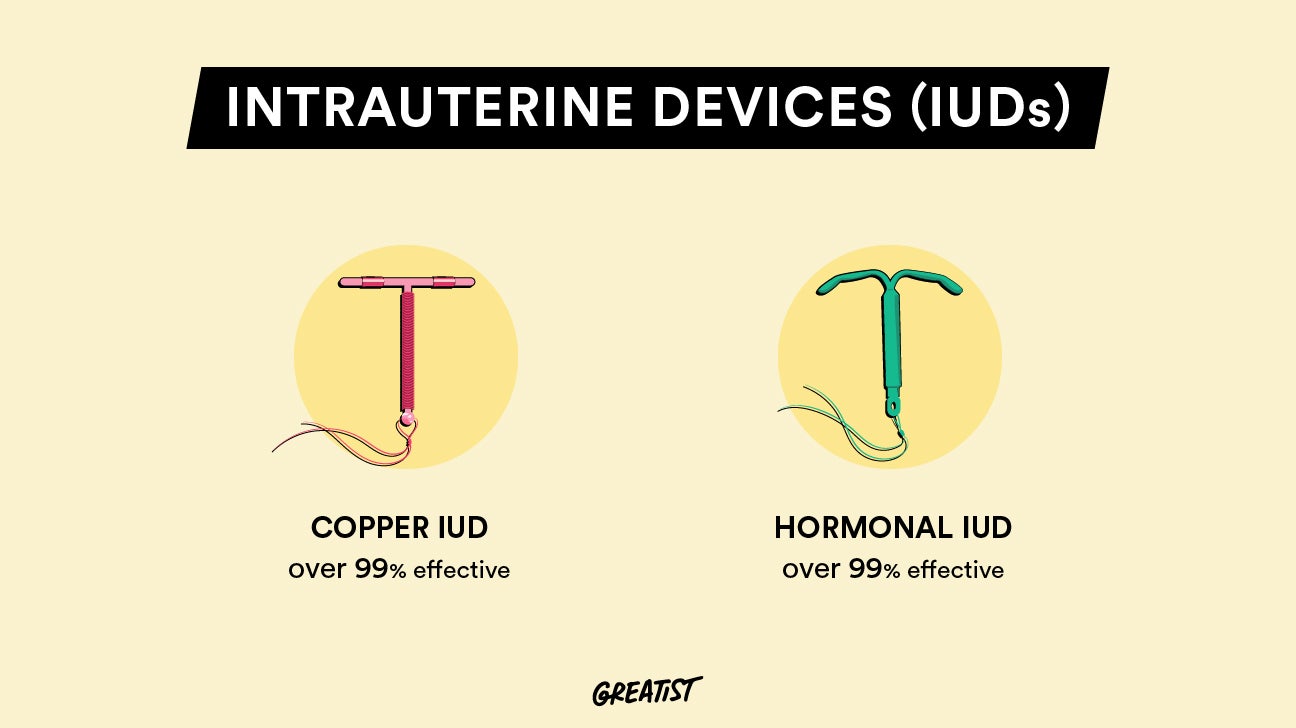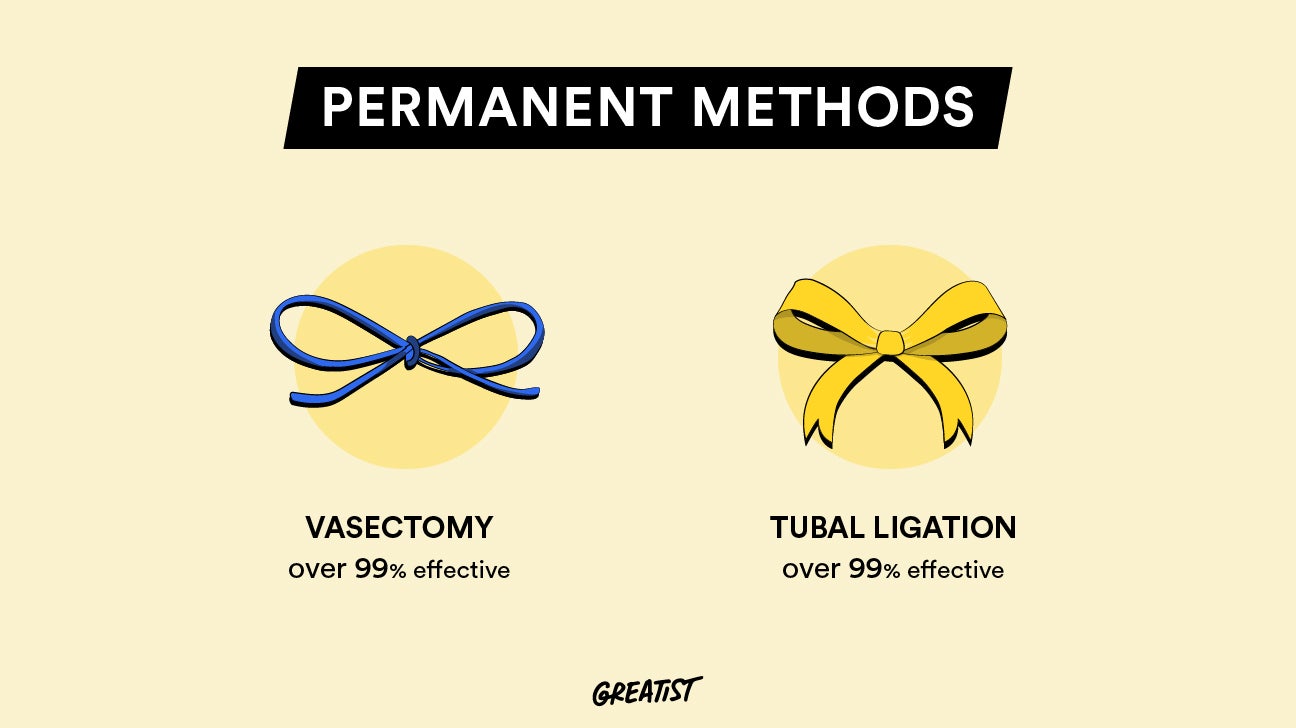Life is all about choices big and small — and so is sex. If you decide to have sex in the first place, one pretty important choice is how to help prevent unwanted pregnancy and sexually transmitted infections (STIs).
Choosing the right birth control method for you might come down to your lifestyle preferences. Do you want a method you can put in and forget about? Is STI prevention front and center in your mind? Do you need a solution for heavy periods?
No matter what you’re looking for in birth control, trust us — there’s a method for you. We know how overwhelming it can be to sort through all the options out there, so we’ve compiled this guide to make it easier to find the method that makes birth control the easiest choice of all when it comes time to get down.
Barrier methods

The way these methods work is right in their name. They put a barrier between sperm and egg. No sperm-egg meetup equals no pregnancy. Barrier methods are also the only birth control methods that prevent STI transmission. There are several different barrier methods.
Condoms
These sheaths are made from latex, polyurethane (plastic), or animal membranes. Male condoms go over the penis. Female condoms line the vagina.
Effectiveness
- External condoms: 98% with perfect use, 87% with typical use
- Internal condoms: 95% with perfect use, 79% with typical use
Pros
- They’re cheaper than other methods.
- You can buy them over the counter.
- You can use them only when you need them.
- Latex and polyurethane condoms prevent STI transmission.
- They’re hormone-free.
Cons
- They’re not as effective as other methods if they’re not used perfectly.
- You have to use them every time you have sex.
- They make sex less spontaneous.
- Some people are sensitive to latex.
Diaphragm and cervical cap
These dome-shaped devices go inside your vagina and fit over your cervix to block sperm from getting inside. A diaphragm is made from silicone or latex. Cervical caps are made from plastic. For the best protection, you’ll need to use either of these methods in combination with spermicide.
Effectiveness
- Diaphragm: 88%
- Cervical cap: 77% to 83% when worn correctly
Pros
- You can insert one a few hours before having sex.
- They’re hormone-free.
Cons
- A doctor has to fit you for one. You should be refitted after giving birth.
- You need to use them with spermicide, which may irritate your vagina and make you more likely to get urinary tract infections.
- Spermicide also increases your risk of getting HIV from a partner who has it.
- Leaving one of these devices in for too long puts you at risk for a rare but serious condition called toxic shock syndrome (TSS).
Sponge
This soft foam device covered in spermicide goes inside your vagina and over your cervix. It stops sperm from entering your uterus.
Effectiveness: 76% to 88%, depending on whether you’ve given birth before
Pros
- You can buy it over the counter.
- It won’t affect your hormones.
- The spermicide is built in.
Cons
- The spermicide could irritate your vagina.
- Spermicide can increase your risk of getting HIV from a partner with the condition.
- Keeping the sponge in for too long can increase your risk for TSS.
Hormonal methods

These methods release the hormones estrogen and progestin to prevent pregnancy. They stop your ovaries from releasing an egg each month, and they make your uterus a much less friendly place for sperm to swim.
Hormonal options include:
- Pill: You take 1 pill each day by mouth. Effectiveness: 93%
- Patch: You wear the patch on your skin and replace it once a week for 3 weeks, then leave it off for 1 week. Effectiveness: 93%
- Ring: You place the ring in your vagina and change it once a month. Effectiveness: 91%
- Implant: A doctor places the implant under the skin of your arm. Effectiveness: more than 99%
- Shot: A doctor gives you the shot once every 3 months. Effectiveness: 94%
Pros
- They can make your periods shorter, lighter, and less crampy.
- They may help with other issues, such as acne breakouts and migraine.
- They can help treat conditions that cause heavy periods, such as endometriosis and fibroids.
- Taking them might lower your risk for ovarian, uterine, and colon cancers.
Cons
- You have to remember to maintain them (with the pill, that means taking one every day).
- They can increase your risk for blood clots, heart attack, and stroke a bit — especially if you’re over 35 or you smoke.
- They can cause side effects like breast soreness, nausea, headaches, and spotting.
- They may be expensive if your insurance doesn’t cover them.
Intrauterine devices (IUDs)

An IUD is a T-shaped device that your doctor places inside your uterus. It prevents pregnancy continuously for years. IUDs come in two varieties:
- Hormonal IUDs release a small amount of the hormone progestin. Depending on which brand you choose, the IUD can keep working for up to 7 years.
- Copper IUDs release a small amount of copper. They work for up to 10 years.
Effectiveness: more than 99%
Pros
- Once an IUD is in place, you can forget about it for years.
- It doesn’t get in the way of sex.
- If you want to get pregnant or stop using it for any reason, you can have it removed.
- Hormonal IUDs typically make periods lighter and less painful over time.
Cons
- Copper IUDs could make periods heavier and more uncomfortable.
- Your periods may be heavier and longer when you first get a hormonal IUD.
- Side effects like headaches, nausea, breast soreness, and mood changes are possible.
- IUDs don’t prevent STI transmission.
Permanent methods

You may have heard people talk about “getting their tubes tied.” Sterilization is a permanent birth control solution for people who are 100% positive they don’t want children. Although it’s reversible, there’s no guarantee of getting pregnant after you’ve had surgery.
The procedure you undergo depends on the reproductive organs you have:
- Vasectomy: This procedure involves cutting or blocking the tubes that carry sperm to the outside of the penis.
- Tubal ligation: This procedure involves cutting or blocking the tubes that carry eggs to the uterus.
Effectiveness: more than 99%
Pros
- It’s extremely effective at preventing pregnancy.
- You won’t have to worry about using birth control to prevent pregnancy ever again.
Cons
- It involves a surgical procedure.
- Risks include pain, bleeding, and infection.
- While sterilization procedures can be reversed, the reversal doesn’t always work.
Fertility awareness methods
If you’re really in tune with your body, you might consider fertility awareness methods. These methods involve getting to know your cycle and when you’re most fertile. By tracking things like your temperature and cervical mucus, you find out when you can have sex with the least risk of pregnancy.
But it’s important to know that this is one of the least reliable ways to prevent pregnancy.
Effectiveness: around 76% with typical use
Pros
- It’s pretty much free to use.
- It doesn’t have any side effects.
Cons
- It’s not as reliable as other birth control methods.
- It won’t prevent STIs.
- You and your partner need to abstain or use a barrier method if you have sex during your fertile days.
Which birth control method is right for you?
With so many methods to choose from, how do you know which one matches your lifestyle? Start by asking yourself a few questions:
- How often do you have sex?
- How many partners do you have?
- What’s your budget? What’s covered by your insurance?
- Are you trying to treat another condition, like endometriosis or heavy periods?
- How effective do you need your method to be for preventing pregnancy?
- Do you prioritize protection against STIs?
- Will you remember to take birth control pills regularly?
Once you’ve thought through all this, you might want to schedule a chat with a primary care doctor or gynecologist you trust. They can help you sort through these and other questions to find the method that will keep you safe and pregnancy-free for as long as you please.
In the meantime, here are a few good options, depending on your needs.
You don’t want to worry about it
In this case, an implant or IUD could be your BFF. Both are more than 99% effective at preventing pregnancy. The implant protects for up to 5 years, while the IUD stays with (or in) you for up to 10 years.
If you’re not into the whole parenting thing, you can consider a more permanent solution: a tubal ligation or vasectomy.
You want it only when you need it
If sex happens just once in a blue moon for you, there’s no need to invest your time and money in birth control. Barrier methods like condoms and the sponge are available at your local drugstore. You can buy them when you need them or get a diaphragm from your doc to keep on hand for when the mood strikes.
You really want to avoid STIs
When you’re swiping right a lot, condoms are the way to go. They’re the only birth control method that helps keep you both pregnancy- and STI-free, as long as you use one every time.
You need it to manage your health
Are your periods annoyingly heavy or painfully crampy? Are you dealing with endometriosis? If so, then one of these hormonal birth control methods may be for you:
- implant
- IUD
- patch
- pill
- ring
- shot
But make sure to use a barrier method in addition to one of these to protect against STIs when you’re having sex.
You want something cheap
If you’re on a budget, condoms may be the most wallet-friendly birth control method, at around $0.50 each.
If you want a more long-term method and you don’t have insurance coverage, some manufacturers of the pill, shot, and IUD offer patient assistance programs to help you cover the cost.
You’re all about natural
Hormones are effective and all that, but they can cause side effects. Condoms and other barrier methods are hormone-free, but they can contain latex and chemicals you may not want to be exposed to. Aside from abstinence, fertility awareness is the only way to go totally au naturale, but you have to stay on top of your cycle.
tl;dr
Having so many birth control methods to choose from definitely has its pros, but one con is that the options can feel overwhelming. Take a deep breath, think about what you want from a birth control method, and ask your doctor for advice to help you make the right choice and keep your sex life anxiety-free.
0 Commentaires